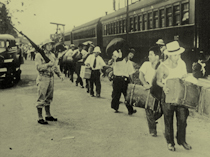

Panama Canal Zone: Japanese Peruvians en route to U.S. Internment Camps. April 2, 1942. U.S. Army Signal Corps Photo. National Archives. Courtesy of National Japanese American Historical Society.
| Join Our Mailing List |
Campaign for Justice
P.O. Box 1384
El Cerrito, CA 94530
(510) 528-7288
info@campaignforjusticejla.org
| WHAT WE DO Litigation The fight for justice continues not only in legislation but in litigation as well. Sixty years after the war, the U.S. government is still fighting Japanese American (JA) and Japanese Latin American (JLA) internees in court. The U.S. government continues to deny its own war crime committed against JLAs, and does not fully acknowledge its civil and human rights violations committed against people of Japanese ancestry during the War. The government has also used technicalities to fight internees in court and to keep the U.S. from being held accountable for its own wrongdoing. Let’s urge the U.S. government to stop the costly and lengthy court battles and to support a proper apology and redress for JAs and JLAs! Unable obtain justice in US domestic courts, three Shibayama brothers (Isamu Art, Kenichi and Takeshi) and the Japanese Peruvian Oral History Project filed a petition with the Inter-American Commission on Human Rights (a body of the Organization of American States) in June 2003. The petition seeks to hold the US government accountable for the ongoing failure to provide redress for war crimes and crimes against humanity committed during WWII. The IACHR is one of the few international human rights forums available to US citizens and resident aliens. Since the U.S. hasn’t ratified the United Nations Convention on Human Rights, US citizens can’t appeal to the UN Commission on Human Rights when domestic courts or government agencies don’t provide adequate remedies. Since the U.S. has not ratified many international treaties, the US government is not accountable to any courts but its own domestic courts. However, since the US is a member of the Organization of American States, all members have pledged to recognize IACHR decisions. Thus the US is obligated to respond to OAS/IACHR petitions and abide by its decisions under the OAS Charter. “This gives U.S. citizens and resident aliens an important human rights forum,” said plaintiffs’ attorney Karen Parker. “This case is important for others working on domestic civil rights issues and for the ongoing redress campaign for Japanese Latin Americans and other groups affected by WWII enemy alien policies.” The IACHR accepted the case despite the US government’s arguments that the IACHR did not have jurisdiction over this issue and that the case should be dismissed. The IACHR found the petition to be admissible, although only in respect of the enactment of the CLA and subsequent efforts to obtain reparations. (The IACHR did not believe that it had temporal jurisdiction to consider the WWII events themselves). Remedies sought include proper apology reflecting the severity of the government violations, equitable redress compensation and full disclosure of the facts, including the fate of disappeared individuals in Latin America and Japan. A decision by the IACHR is still pending.
|
HOME | WHO WE ARE | WHAT WE DO | GET INVOLVED
RESOURCES | HISTORY | MEDIA ROOM | LINKS
Contact: Campaign for Justice